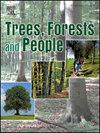Farmers’ knowledge, attitude, and motivation for adoption of climate-smart agroforestry in two contrasting agroecosystems of Rwanda
IF 2.7
Q1 FORESTRY
引用次数: 0
Abstract
Globally, the experiences show that climate-smart agroforestry (CSAF) can contribute to sustainable agricultural growth and rural transformation while tackling climate change. This study evaluated the interplay between farmers’ knowledge, attitude, and motivation to adopt CSAF. The study used data from 381 farmers surveyed in Bugesera and Rulindo regions, Rwanda. Bugesera, in the semi-arid savannah lowlands, and Rulindo, in the temperate central highlands, were purposively selected for their distinct physiographic features. A questionnaire was used to collect the data and descriptive statistics, Pearson correlation, and binomial logistic regression were performed for data analysis. The results from the correlation analysis showed that various revealed factors, including gender, civil status, education, household size, household poverty level (ubudehe), farm size, farmers’ experience in CSAF, ownership of radio and mobile phone, livestock herd size, farm-river distance, training, and extension visits, influenced farmers’ knowledge in adopting CSAF. The most significant positive correlation was found between owning a mobile phone and farmers’ knowledge, while the weakest positive correlation existed between farmers’ gender and their knowledge of CSAF. These factors equally affected farmers’ attitudes, except for statistically insignificant gender. The most significant positive correlation was between owning a mobile phone and farmers’ attitudes, while the weakest was between extension visits and farmers’ attitudes towards CSAF. Further, results revealed a positively significant relationship between the farmers’ ages and their motivation to adopt CSAF. Additionally, the binomial logit regression analysis showed that farmers knowledgeable with CSAF were 2.5 times more likely to practice CSAF than farmers without such knowledge. Moreover, being motivated by CSAF benefits increased the likelihood of adopting CSAF by 0.6 times compared to unmotivated farmers. By filling the gap in understanding farmers’ knowledge, attitudes, and motivations toward CSAF adoption, this study contributes to advancing sustainable agricultural practices in Rwanda. It provides a blueprint for similar initiatives elsewhere.
卢旺达两个截然不同的农业生态系统中农民采用气候智能型农林业的知识、态度和动机
在全球范围内,经验表明,气候智能型农林业可以在应对气候变化的同时促进可持续农业增长和农村转型。本研究旨在评估农户采用农粮的知识、态度和动机之间的相互作用。该研究使用了来自卢旺达Bugesera和Rulindo地区381名农民的调查数据。位于半干旱草原低地的Bugesera和温带中部高地的Rulindo因其独特的地理特征而被有意选择。采用问卷调查收集资料,并采用描述性统计、Pearson相关和二项logistic回归进行数据分析。相关分析结果显示,性别、公民身份、受教育程度、家庭规模、家庭贫困程度(ubudehe)、农场规模、农民农牧经验、收音机和手机拥有量、畜群规模、农场与河流距离、培训和推广访问等因素影响农民农牧知识。拥有手机与农民农资知识的正相关最显著,而农民性别与农资知识的正相关最弱。这些因素同样影响农民的态度,除了统计上不显著的性别。拥有手机与农民态度之间的正相关最显著,而延伸访问与农民对CSAF的态度之间的正相关最弱。此外,研究结果还显示,农民的年龄与他们采用农资的动机之间存在显著的正相关关系。此外,二项logistic回归分析显示,了解CSAF的农民比不了解CSAF的农民实践CSAF的可能性高2.5倍。此外,受CSAF利益激励的农民采用CSAF的可能性比不受激励的农民高0.6倍。通过填补在了解农民采用CSAF的知识、态度和动机方面的空白,本研究有助于促进卢旺达的可持续农业实践。它为其他地方的类似举措提供了一个蓝图。
本文章由计算机程序翻译,如有差异,请以英文原文为准。
求助全文
约1分钟内获得全文
求助全文
来源期刊

Trees, Forests and People
Economics, Econometrics and Finance-Economics, Econometrics and Finance (miscellaneous)
CiteScore
4.30
自引率
7.40%
发文量
172
审稿时长
56 days
 求助内容:
求助内容: 应助结果提醒方式:
应助结果提醒方式:


